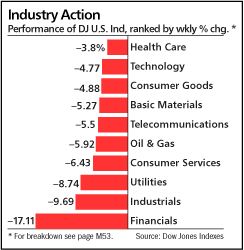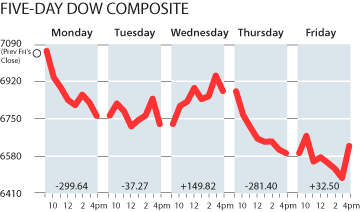By Jay Hancock
September 8, 2008
The government bailed out mortgage giants Fannie Mae and Freddie Mac yesterday, belying dozens of Fannie and Freddie executives who said year after year that such a thing would never - could never - happen."The U.S. government does not guarantee, directly or indirectly, our securities or other obligations," Fannie said in its last annual report. "We are a stockholder-owned organization, and our business is self-sustaining and funded exclusively with private capital."The companies are about to receive what we can conservatively estimate will be tens of billions in taxpayer dollars. That's not private capital.But whatever the total bill, however maddening it may be to lose again in Wall Street's "heads I win, tails taxpayers lose" version of capitalism, the price is worth it.
What's happening THE TAKEOVER:
The government is taking control of mortgage finance companies Fannie Mae and Freddie Mac, injecting money into them and installing new chief executives. The government may buy up to $100 billion of preferred stock in each company, making the investments when needed. It also plans to make an initial purchase of $5 billion in mortgage-backed securities and will receive warrants representing ownership stakes of nearly 80 percent of each company.
THE REASON:
Treasury Secretary Henry M. Paulson Jr. says the action is needed to stabilize the housing market and prevent the financial system from being thrown into chaos if either company collapses. That's critical because Fannie and Freddie own or guarantee about $5 trillion in mortgage loans.
THE COST:
It will largely depend on how far home prices fall and how many more borrowers wind up defaulting. The Congressional Budget Office estimated earlier this year that such an intervention could cost about $25 billion but conceded that its projections were hazy. The cost of doing nothing would have been higher.
Yesterday, Treasury Secretary Henry M. Paulson Jr. announced a plan to replace Fannie's and Freddie's leadership and inject unlimited amounts of government cash to keep them above water.Washington will take large ownership stakes in the companies, lend them money and also start buying Fannie and Freddie mortgage bonds trading in the open market. The rescue should lower mortgage interest rates and rekindle the courage of the home buyers and home sellers who make the whole thing work. The government's effective new role as national mortgage lender may - may - finally slow the dangerous spiral of defaults, declining home prices and dwindling home sales. Together Fannie and Freddie guarantee mortgages worth $5 trillion, an amount bigger than every economy in the world except that of the United States. One way or another, they must reimburse nearly half of U.S. mortgage holders in the event homeowners don't pay. As mortgage losses depleted Fannie's and Freddie's reserves in recent months, their ability to do so eroded and soon would have disappeared. That would have been catastrophic. Investors everywhere own Fannie- and Freddie-backed mortgages. China alone holds more than $300 billion worth. You're probably a Fannie- and Freddie-guaranteed lender if you're part of a pension plan or have bonds in your 401(k) plan.Default would trigger a diplomatic crisis and a worldwide bond-market plunge. "Conservative" mutual funds would get creamed. The dollar would crash. Banks would go under, requiring bailouts from the Federal Deposit Insurance Corp. And hardly anybody would have lent money to buy a house for a long, long time.
The rescue doesn't include shareholders. This is painful for people who own stock in Fannie Mae and Freddie Mac and for years enjoyed supersized returns.The takeover is more terrible news in a miserable year for Baltimore mutual-fund house Legg Mason and Bill Miller, its well-known mutual fund manager. At the end of July, Legg Mason Capital Management Inc. and its affiliates reported owning 79.9 million Freddie Mac common shares. The 12.4 percent stake made Legg Mason the mortgage company's largest shareholder. Fannie's and Freddie's shares had already fallen more than 80 percent from highs reached last year. Under yesterday's plan the government would eliminate the common-stock dividends, which in Fannie's case had already sunk to a measly nickel a share per fiscal quarter. More ominously, Washington will begin to take over Fannie's and Freddie's ownership. Every time the companies need taxpayer cash to pay off a dubious loan that probably never should have been issued, the government will get new ownership stakes or options in return. Thus Fannie's and Freddie's present shareholders will own smaller and smaller portions of companies with very iffy long-term prospects. Future profits will reimburse taxpayers for the bailout.
Starting in 2010 the companies must steadily shrink their holdings, limiting the long-term upside. Paulson was quite gracious yesterday as he fired both companies' CEOs and every single one of their board members. Maybe that's because previous managers bear much of the blame for the present disaster.Institutionally, however, the companies have much to answer for. They cooked their books for years. As recently as last week, government accountants found that Freddie was overstating its capital cushion, several newspapers reported yesterday. In an attempt to pump up profits, they loaded up on riskier loans even as the housing market cratered. A Fannie staffer once threatened "criminal proceedings" against Congress if it disclosed information about Fannie's executive pay. Blessed with below-market borrowing costs thanks to implicit government backing, the companies were supposed to pass along the savings to middle-class homeowners. Instead they spent most of the dough on executive salaries, shareholder profits and lavish lobbying and public relations campaigns, the Congressional Budget Office found a few years ago. Yesterday Paulson silenced Fannie's and Freddie's lobbying operations.The bailout probably dooms Fannie's "We're in the American dream business!" slogan forever. It should also prove crucial in ending what has become a dark American nightmare.
Subscribe to:
Post Comments (Atom)


No comments:
Post a Comment